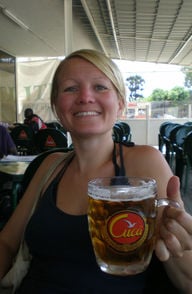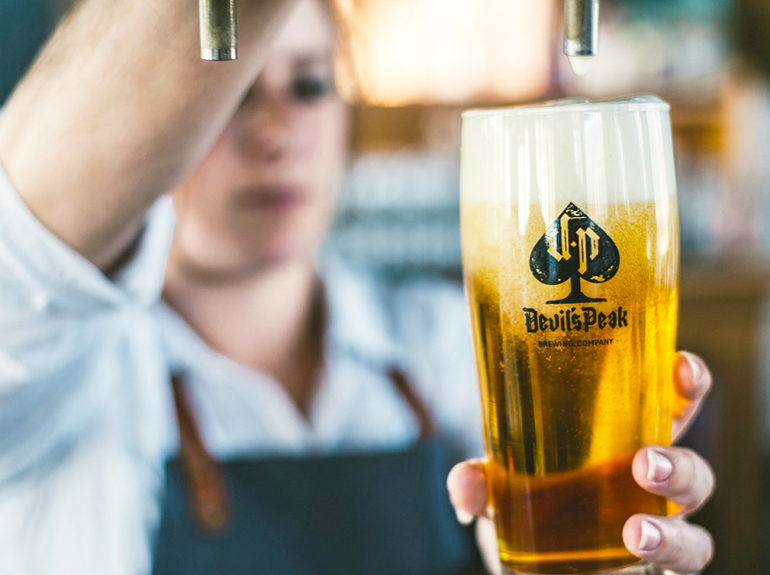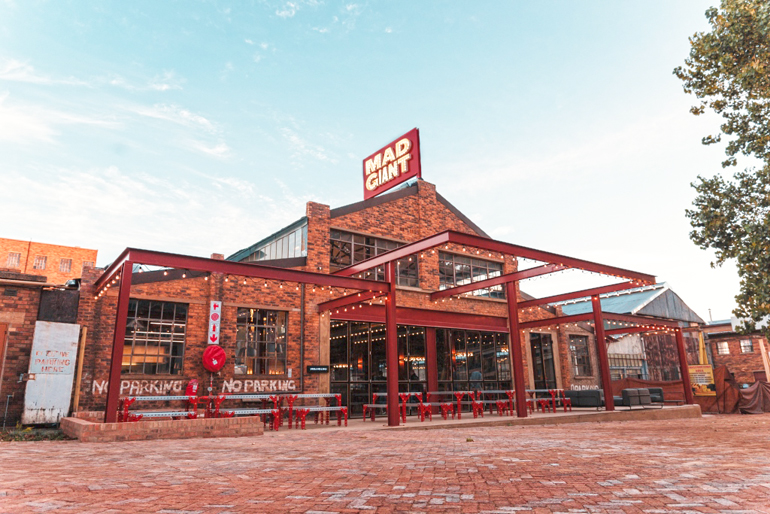Start 14-Day Trial Subscription
*No credit card required

The Evolving Craft Beer Scene of South Africa
Back in the city, there is an urban brew route emerging in the arty suburb of Woodstock. Here, you can ditch your car and walk from taproom to taproom, starting at Riot Brewery, known for its heavily-hopped IPAs. Just half a mile away, Drifter Brewing Company also produces a popular IPA, alongside a red lager and an ale infused with coconut. A five-minute walk away is one of South Africa’s most interesting breweries, the Brewers Co-op. Established in 2015, the Co-op sees 15 former homebrewers coming together to brew 120-liter batches of anything from a blonde ale using South African-grown malt and hops to a rye IPA that took the top spot in the country’s 2015 National Craft Championships.
The nearby Woodstock Brewery is known for its seasonal ales, which are on sale in the taproom alongside the core range, developed by an American homebrewer who used to call Cape Town home. And then there is Devil’s Peak Brewing Company, considered to be at the forefront of craft brewing in South Africa. They were the first to introduce the American IPA to a wider South African audience and while their lager far outsells the superb King’s Blockhouse IPA, the latter has won numerous awards as well as a cult following around the country. Their barrel-aged saisons, sour ales and beer-wine hybrids have a smaller fanbase but the new, limited-edition releases ensure that Cape Town’s growing contingent of beer geeks keep coming back to Devil’s Peak’s urban taproom.

Devil's Peak in Cape Town is one of the most well-known South African breweries due to the cult following of its King's Blockhouse IPA.
Cape Town is certainly the center of the South African brewing scene, with close to half of the country’s breweries in or around the city, but that’s not to say that there’s nothing happening elsewhere – breweries are scattered around all nine of South Africa’s provinces. There are breweries with 25-barrel (300-litre) systems cobbled together from old milk or wine or olive tanks; there are tiny 4-barrel (50-litre) breweries sitting on farms near the famous Kruger National Park; there are part-time brewers producing thirst-quenching lagers in surfing hotspots along the coast; there are cozy brewpubs serving warming Belgian styles in the foothills of the Maluti Mountains; and there are stylish taprooms opening in the gritty city centre of Johannesburg. The newest addition to the so-called “City of Gold” is Mad Giant, yet another brand that has traded in contract brewing for a real-life brewhouse, this time in a spectacularly revamped building in a gentrified corner of Johannesburg.

Jonannesburg's Mad Giant transitioned from nomadic contract brewing to a brick-and-mortar establishment, which is a common trend among South Africa's craft breweries.
One thing that many of these breweries have in common is that somewhere in their range, you’ll find a pale lager or a blonde ale so lager-like that most drinkers can’t tell the difference. Whether it’s the weather or the country’s long-term love affair with lager, it’s still the style that most South Africans reach for while they’re watching cricket or hosting their beloved braai (barbeque). But while most breweries do produce a crowd-pleaser, the beer repertoire is expanding swiftly and in some very interesting directions. For the most part, of course, South African brewers are producing global beer styles – Belgian witbiers, German weissbiers, American Pale Ales and Irish stouts – but there is an increasing trend towards giving beer recipes a South African twist.
Those of you that occasionally drink something other than beer might be familiar with rooibos, also known as “red bush,” a type of herbal tea produced solely in South Africa. The indigenous plant has recently found another use with a handful of breweries using it to flavor their beers. Grown in similar areas and also used in tea is buchu, a medicinal herb with a pungent, menthol-like aroma. Used in small quantities, it can add a pleasant sweetness to a beer and offers interesting aromas of mint and blackcurrant. It is perhaps best represented in Loxton Lager, a 4.8% ABV pale lager flavored with buchu, honey and other indigenous herbs. It’s one of those beers that you’ll love or loathe, but it’s a must-taste if you’re visiting – it doesn’t get much more South African than this!



